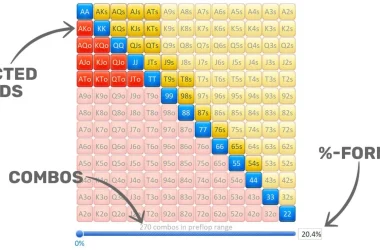Bluffing can be an effective poker strategy, but its use must be limited and measured. Overuse will result in its decreasing effectiveness; select your opponents carefully to avoid frequent callers as you could lose its impact.
Experienced players possess the knowledge needed to read their opponents’ tells and interpret the action with strategic decisions. This enables them to direct proceedings and take necessary measures.
Game of chance
Bluffing in poker is an invaluable skill that can turn you into a formidable competitor, but it requires careful planning to use effectively. The top players often employ this tactic frequently and are able to gain money from opponents without strong hands by convincing them of bluffs that may occur at other tables; additionally, skilled bluffers can use this strategy to alter table dynamics by sowing seeds of doubt in opponents’ minds and shifting focus from them onto them.
To effectively bluff, it is crucial that you analyze and read your opponents like a pro. This includes recognizing physical poker tells, bet timing signals and verbal clues from opponents as well as accurately calculating pot odds to gauge whether a bluff will succeed or fail. In addition, take your position at the table into account when deciding how often and when you should bluff; doing so will allow for more accurate bets, particularly in late position. Finally, avoid bluffing against weak opponents who lack experience or don’t seem as likely.
Game of skill
Skilled at bluffing can give you the edge over opponents when they have the best hand. To succeed at this strategy, study your opponent’s body language and pay attention to any signs they give off; these could include anything from yawns, sighs or how they shuffle their chips to how they pronounce words – as this may reveal information without even meaning to.
Be wary when making bet sizing decisions when bluffing, as smaller bet sizes don’t require as many folds to turn a profit; however, finding your sweet spot can sometimes be challenging. Additionally, keeping in mind your opponent’s tendencies and betting patterns will aid you in making informed decisions when it comes to bluffing. Bluffing is an integral skill every poker player should hone; it can be an invaluable way to increase pot wins; yet without proper guidance it could become destructive instead.
Game of psychology
Bluffing is an integral component of poker strategy that can drastically increase your winning percentage. But it should never be seen as the end-all solution – instead it must be implemented alongside an effective game plan and regular playing habits. The best bluffers know the dynamics of their table well enough to use that information effectively, reading opponents as well as understanding the strength of their hands to play to their strengths.
Bluffing frequency depends on several variables, including your opponent’s preflop tendencies and bet size. Your table image also plays a part: if people perceive you as being tight-fisted, their bets will more likely be believed as representing strong hands than otherwise.
Pay careful attention to your opponents’ body language, expressions, and betting patterns – including any tells such as yawns or sighs; notice their card and chip holding styles; these could provide vital clues as to whether or not they might call your bluff.
Game of bluffing
An effective bluff can give players a huge edge in poker, persuading opponents they possess stronger hands than they actually do, thus enabling them to win without showing their cards. But bluffers must master this art carefully while maintaining an unflappable poker face without showing signs of anxiety or doubt in order for this strategy to work successfully.
Bluffing is an integral component of poker strategy, yet can be tricky to master. Luckily, there are a variety of methods that can help you improve your bluffing game: one such method involves assessing an opponent’s range and connectivity with the board to decide when it makes sense to bluff; while another includes studying their betting patterns for any tells that may reveal their strength of hand (i.e. frequently checking with hands like king-high which have no showdown value but may indicate bluffing).






